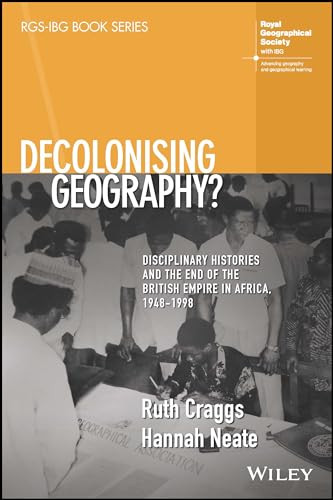Product desciption
Decolonising Geography Disciplinary Histories And The End Of The British Empire In Africa 19481998 Rgsibg Book Series 1st Edition Craggs by Craggs, Ruth, Neate, Hannah 9781119549307, 1119549302 instant download after payment.
DECOLONISING GEOGRAPHY? “This book presents an extraordinarily sensitive account of geography’s histories in five African countries subjected to British colonial rule. Craggs and Neate draw together political and imaginative processes of decolonisation, through an innovative biographical approach that humanizes and enlivens the story of our academic discipline. It will be an invaluable resource for those seeking a deeper understanding of??decolonisation, its recent trajectories and far-reaching implications, on the African continent.” —Shari Daya, Affiliate Associate Professor in Environmental and Geographical Science, University of Cape Town “By placing the experiences, ideas, and practices of African geographers in the center of their analyses, Craggs and Neate provide an unprecedented account of historical and contemporary decolonizing struggles within Geography and the academy. This book should be required reading for all those looking to decolonize the discipline and dislodge it from its Global North histories, institutions, and ideologies.” —Mona Domosh, Professor of Geography, The Joan P. and Edward J. Foley Jr. 1933 Professor, Dartmouth College “This meticulous work explores how colonialism, decolonization and postcolonialism shaped African geography and geographers. It sheds light on efforts to ‘Africanize’ the discipline, a process which I was both witness to and a participant in.” —Stanley Okafor, Professor of Geography (Retired), University of Ibadan How did a generation of academic geographers engage with constitutional decolonisation during the end of the British empire in Africa? In Decolonising Geography? Disciplinary Histories and the End of the British Empire in Africa, 1948-1998, Ruth Craggs and Hannah Neate explore how the teaching, research, administration and activism of geographers in Africa shaped the discipline and the post-colonial geopolitics of the continent. The authors follow the professional lives of individual geographers to provide fresh insights into decolonisation in the former British Empire in Africa, drawing from extensive archival research and more than 40 oral history interviews with geographers in Ghana, Nigeria, South Africa, Tanzania and the UK. Decolonising Geography is a must-read for any reader in the UK and Africa with an interest in the relationships between geography and decolonisation.


